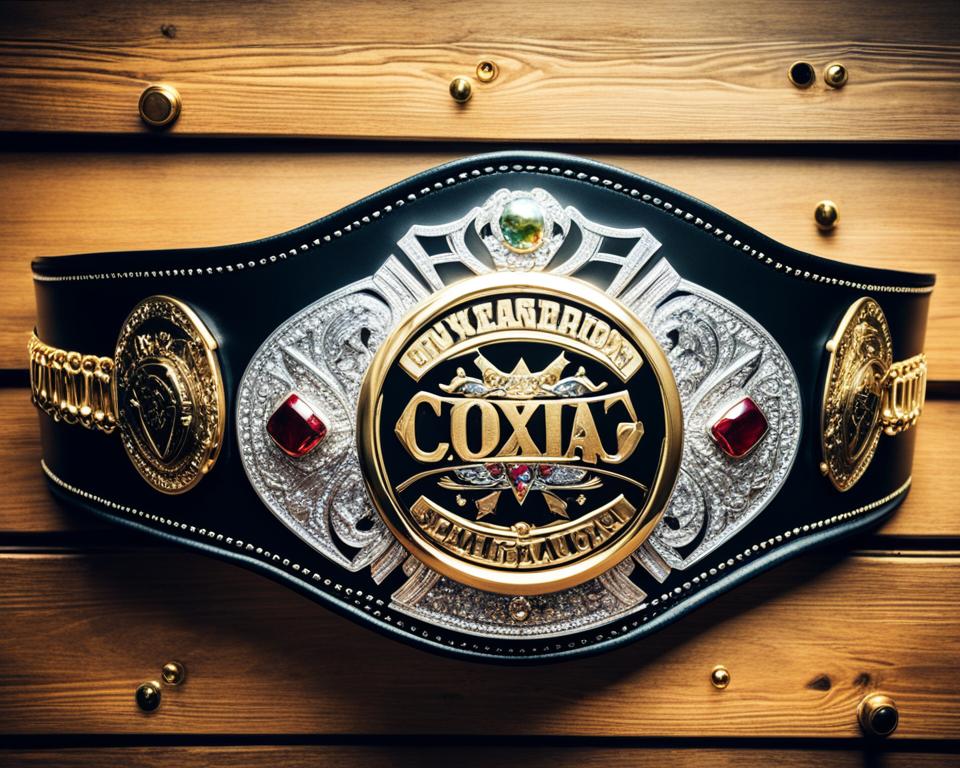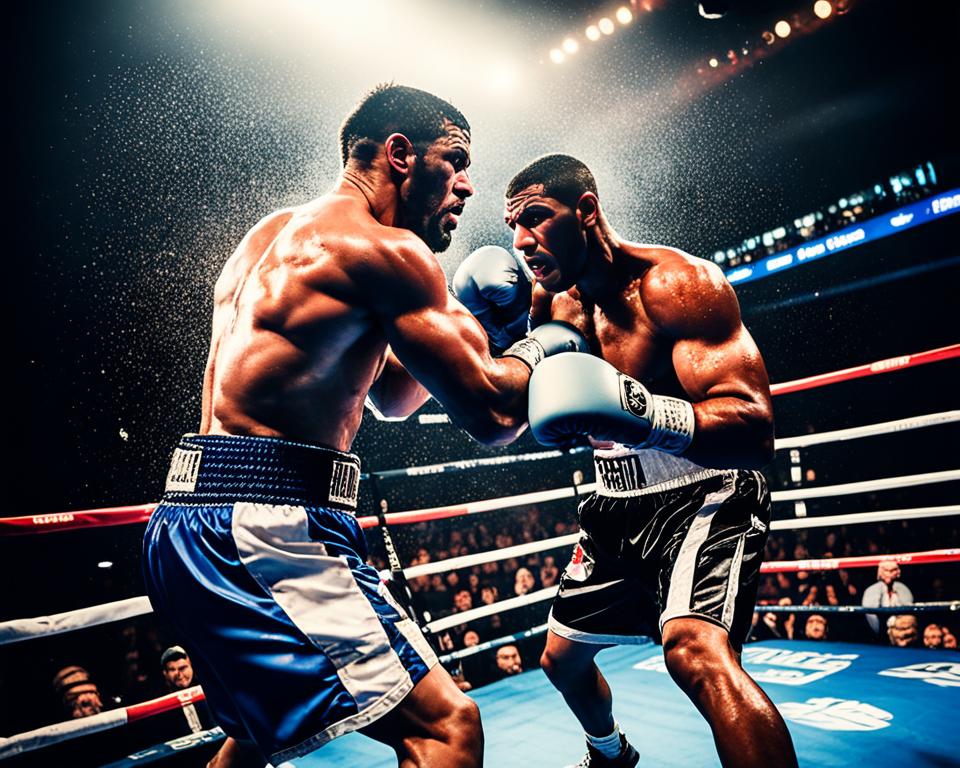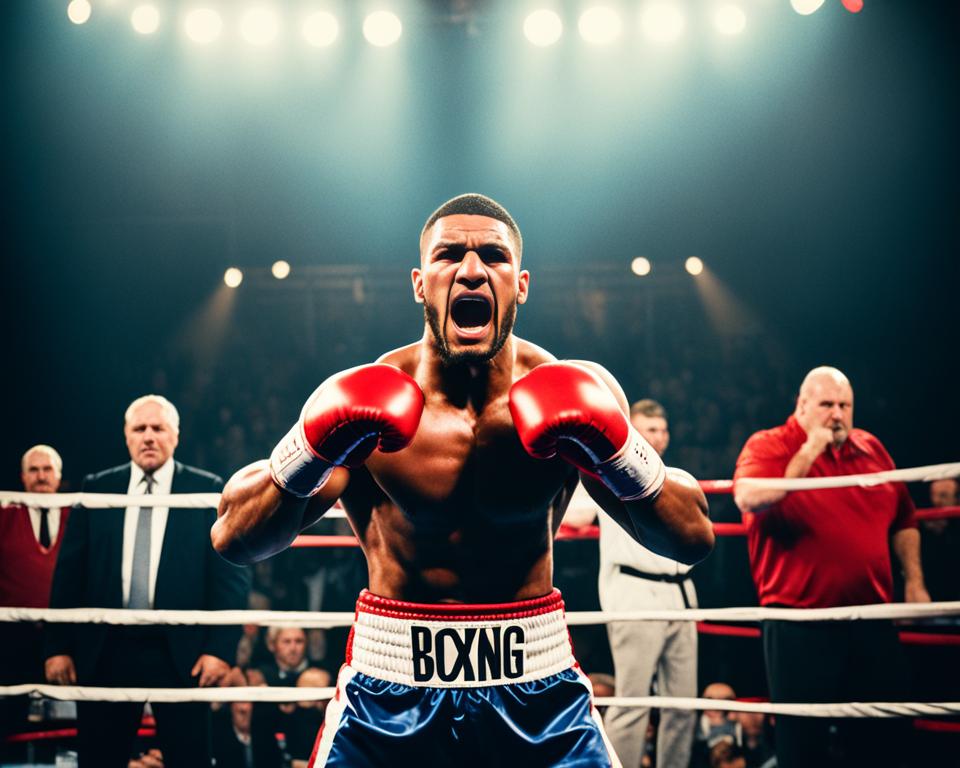
In the exciting world of boxing, championship belts and titles mean a lot. They stand for the highest honor a boxer can achieve. This guide dives into the world of boxing championships. It looks at their history, the major organizations, and the champions who made history.
Boxing has different divisions, such as heavyweight, which is the most popular. This article helps you understand how boxing titles work, no matter if you’re a casual observer or a big fan. It explores the sport’s history and the details of how champions are crowned. Think of this guide as your key to the thrilling world of boxing belts and championships.
Read interesting things at : luoghievisioni
Key Takeaways
- Explore the significance and prestige of boxing championship belts and titles
- Understand the different levels of boxing championships and the major sanctioning bodies that govern them
- Delve into the legacy of iconic heavyweight champions and their championship reigns
- Discover the challenges and strategies involved in unifying the various boxing titles
- Gain insights into the business and marketing opportunities surrounding championship belts
What are Boxing Belts and Championships?
In the boxing world, belts and championships mean everything. They show who’s the best at their weight class. Boxing champions work hard to win these titles, proving their skills and talents on the ring.
Understanding the Significance of Boxing Titles
Winning a boxing belt is a big deal. It shows how much a fighter has worked and fought to be the best. This championship represents beating the top fighters in the division, making the holder the boxing champion.
A boxing belt is a big achievement in a fighter’s career. It secures their name in boxing history. This brings them respect from everyone in the boxing world.
The Different Levels of Boxing Championships
- Regional and National Boxing Championships: These are the first titles fighters aim for. They are usually at the state or provincial level. They help fighters climb to the top.
- Continental Boxing Championships: Next are titles for a whole continent or big region, like the European Boxing Championships. They show a fighter is among the best in a large area.
- Global Boxing Championships: The top honor in boxing are the world titles. Organizations like WBC, WBA, IBF, and WBO award these. They are the dream for every boxer to win.
Every boxing championship means a lot, but winning a world title stands above all. Boxers with these boxing belts are seen as the true champs of their weight class. They earn the highest respect in boxing.
Major Boxing Sanctioning Bodies
In the world of professional boxing, sanctioning bodies play a key role. They oversee title awards in different weight categories. These groups include boxing federations, boxing organizations, and boxing governing bodies.
The big boxing sanctioning bodies are the WBA, WBC, IBF, and WBO. They set rules for title fights. This makes sure all boxers have a fair chance and protects the sport’s honor.
The Role of Governing Organizations
These boxing governing bodies have important jobs:
- Sanctioning and overseeing title fights
- Ranking and determining the top contenders in each weight class
- Enforcing anti-doping rules and safety measures
- Settling sport-related disputes and issues
- Helping the sport of boxing grow around the world
Though boxing organizations work together, sometimes they compete for power. They can make decisions that really impact a boxer’s career.
| Sanctioning Body | Headquarters | Founded | Notable Championships |
|---|---|---|---|
| World Boxing Association (WBA) | Panama City, Panama | 1921 | WBA World Championship, WBA Super Championship |
| World Boxing Council (WBC) | Mexico City, Mexico | 1963 | WBC World Championship |
| International Boxing Federation (IBF) | Springfield, New Jersey, USA | 1983 | IBF World Championship |
| World Boxing Organization (WBO) | San Juan, Puerto Rico | 1988 | WBO World Championship |
Boxing sanctioning bodies greatly influence professional boxing. They decide who the champions are and promote fair play. Their choices deeply affect boxers’ futures and the sport’s integrity.
The Prestige and Legacy of Championship Belts
In the boxing world, nothing beats the honor of holding a championship boxing belt. These boxing titles show the top achievement in the game. They mark one’s victory over rivals. The names of boxing champions are forever honored, thanks to these prized boxing championships.
Getting a boxing belt stands for more than a trophy. It proves an athlete’s talent, hard work, and the drive to be the best. The boxing champion with the belt is a role model. They push young boxers to reach for greatness.
“The boxing belt is a symbol of the ultimate triumph in our sport. It represents the culmination of years of hard work, sacrifice, and an unwavering commitment to excellence. To be called a boxing champion is to be recognized as one of the best in the world, and that legacy lasts forever.”
The story of boxing championships is full of legends. From the greats of the past to today’s heroes, they all added to the sport’s story. These boxing champions amazed us with their skills and perseverance.
| Legendary Boxing Champions | Boxing Titles Held | Years as Boxing Champion |
|---|---|---|
| Muhammad Ali | Heavyweight Boxing Championship | 1964-1967, 1974-1979 |
| Sugar Ray Leonard | Welterweight, Middleweight Boxing Championships | 1979-1981, 1987 |
| Floyd Mayweather Jr. | Multiple Boxing Championships across 5 weight classes | 1998-2015 |
The fame and honor of boxing championship belts go beyond single champions. These symbols are key to the sport. They captivate everyone and encourage future boxers to chase their dreams.
The Heavyweight Division: Boxing’s Marquee Championship
The heavyweight division stands as the top tier of boxing, cherished by fans and media. Its champions hold the most respect. The heavyweight boxing championship is seen as the highest reward, claimed by iconic athletes.
Historic Heavyweight Champions and Their Belts
Over time, incredible fighters have grasped the heavyweight title. These include greats like Jack Johnson and Jack Dempsey, as well as modern legends such as Muhammad Ali and Mike Tyson. Each era saw a new superstar rise to the top.
Winning the heavyweight boxing championship belts marks true veteran fighters in the sport. These boxing titles are deeply respected, showing outstanding achievement and greatness.
| Heavyweight Champion | Championship Belts Held | Years as Champion |
|---|---|---|
| Muhammad Ali | WBA, WBC, The Ring | 1964-1967, 1974-1978 |
| Mike Tyson | WBA, WBC, IBF | 1986-1990 |
| Lennox Lewis | WBC, IBF, The Ring | 1997-2003 |
| Wladimir Klitschko | WBA, WBO, IBF, The Ring | 2006-2015 |
The heavyweight champions have not just excelled in the sport. They’ve created a boxing legacy that lives on through their championship belts. Their achievements continue to inspire fans worldwide.
“The heavyweight championship is the most coveted title in all of sports. It’s the holy grail of our industry.”
– Don King, Legendary Boxing Promoter
Weight Classes and Championship Belts
In professional boxing, fighters are put into weight classes. This divides them into categories based on their weight. Each category has a special boxing championship belt to win. It’s like a crown, showing who’s the best in that class.
There are many classes, from Strawweight, the lightest, to Heavyweight, the biggest. This setup makes sure every fight is even and fair. A person in Strawweight doesn’t have to face someone in Heavyweight. It’s all about finding fair matches for everyone.
| Weight Class | Championship Belt |
|---|---|
| Strawweight | WBC, WBA, IBF, WBO Strawweight Championship |
| Light Flyweight | WBC, WBA, IBF, WBO Light Flyweight Championship |
| Flyweight | WBC, WBA, IBF, WBO Flyweight Championship |
| Super Flyweight | WBC, WBA, IBF, WBO Super Flyweight Championship |
| Bantamweight | WBC, WBA, IBF, WBO Bantamweight Championship |
| Super Bantamweight | WBC, WBA, IBF, WBO Super Bantamweight Championship |
| Featherweight | WBC, WBA, IBF, WBO Featherweight Championship |
| Super Featherweight | WBC, WBA, IBF, WBO Super Featherweight Championship |
| Lightweight | WBC, WBA, IBF, WBO Lightweight Championship |
| Super Lightweight | WBC, WBA, IBF, WBO Super Lightweight Championship |
| Welterweight | WBC, WBA, IBF, WBO Welterweight Championship |
| Super Welterweight | WBC, WBA, IBF, WBO Super Welterweight Championship |
| Middleweight | WBC, WBA, IBF, WBO Middleweight Championship |
| Super Middleweight | WBC, WBA, IBF, WBO Super Middleweight Championship |
| Light Heavyweight | WBC, WBA, IBF, WBO Light Heavyweight Championship |
| Cruiserweight | WBC, WBA, IBF, WBO Cruiserweight Championship |
| Heavyweight | WBC, WBA, IBF, WBO Heavyweight Championship |
Look at this table. It shows all the boxing weight classes and the championship belts. Every boxer dreams of winning their class’s belt. From the quick Strawweights to the Strong Heavyweights, every class is important in its own way.
The boxing belt system is key to making the sport fair. It makes sure that fighters compete against others of the same size and skill. This keeps the sport exciting and fair. And it makes every boxing title valuable and respected.
Unifying the Titles: The Ultimate Goal
In boxing, many fighters aim to unify several major titles in one weight class. A title unification match is a big event. In this fight, athletes try to win all the important titles in their division. Being the undisputed champion means holding all the major belts.
The Challenges of Unification Bouts
But, setting up these big fights is hard. There’s a lot to figure out with the different boxing championships and sanctioning bodies. For those in charge, it’s a big task to get everything, like schedules and contracts, to line up. The needs of many people and groups involved can make it tough to get all these parts moving together for a title unification match.
Also, becoming the undisputed champion brings a lot of fame and money. This can lead to tough talks and arguments among the fighters and those who represent them. Finding the balance between what everyone wants, the rules, and making money is tricky. It needs a lot of careful planning and smart moves.
| Challenges of Boxing Title Unification | Impact |
|---|---|
| Aligning Schedules and Contractual Obligations | Delays in organizing the bout and potential missed opportunities |
| Navigating Sanctioning Body Rules and Regulations | Disputes over the legitimacy and recognition of the undisputed title |
| Balancing Fighter Demands and Promoter Interests | Challenges in finalizing the terms and conditions of the fight |
But, despite the challenges, the boxing world is always excited by the idea of unification fights. They see it as a way to prove who’s the best and achieve the highest point in boxing. Both boxers and their supporters are motivated by the dream of becoming the sole and recognized champion. This dream keeps the interest in these challenging boxing championship fights alive.

Boxing Championship Tournaments
Championship tournaments in boxing are a big deal, drawing in both fans and fighters. They’re prestigious events that match the top boxers against each other. These competitions decide who’s the best in their weight class. They’re exciting for the tough contests, unknown outcomes, and the titles at stake.
These tournaments come in all shapes and sizes. Some follow a single-elimination structure, where one loss means elimination from the tournament. Others use a round-robin format, giving fighters more chances to win. No matter the design, they test a boxer’s skills and heart. To win, they have to prove they’re the toughest in the ring.
Winning a boxing tournament is a huge achievement. Champions not only get a belt but also become part of boxing history. For example, victories from famous fights, such as “Rumble in the Jungle” and “Thrilla in Manila,” are forever remembered.
These tournaments do more than just name a winner. They grip the interest of people all over the world. This boosts the sport’s popularity, adding new fans, and making money. The excitement around these events helps boost boxing’s reputation globally.
Championship tournaments will always be important in the world of boxing. They show off the best boxers’ talent and how tough they are. They help create new heroes in the sport, inspiring future generations of boxing stars.
The Business of Boxing Belts and Championships
Boxing is more than just fighting. It’s a big business world. Boxers and promoters can make a lot of money from owning and defending championship boxing belts. These belts offer great chances for promotion and branding.
The center of this business world is the boxing titles. They range from heavyweight to different weight classes. These are not just symbols. They bring in money through sponsorships, selling products, and media rights.
Marketing and Branding Opportunities
Boxing championships are very prestigious. They help boxers get famous worldwide. This opens doors for big money deals, making products together, and even acting.
Promoters also see the value of boxing belts. They work hard to make big fights exciting. This draws in sponsors, broadcasters, and fans who pay to watch.
| Revenue Stream | Potential Value |
|---|---|
| Sponsorship Deals | Upwards of $1 million per fight |
| Merchandising Rights | Millions in licensed product sales |
| Media Rights | Hundreds of millions in broadcast fees |
The success of boxing championships shows how strong the sport is. It proves how much people want these titles. Managing boxing belts right is key for the money game in boxing.
“The boxing title is the ultimate prize in our sport. It’s not just about the glory – it’s about the business opportunities that come with it.”
Controversial Decisions and Disputed Championships
The world of boxing championships is full of controversies and disputed fights. These situations often spark debates about who truly deserves a title or a belt. They have a big impact on the sport and how it’s run.
In 2016, Manny Pacquiao and Jessie Vargas had a fight that sparked a lot of debate. Many fans and experts thought Pacquiao won, but the judges picked Vargas. This controversial decision caused a lot of anger and talk among boxing fans.
In 2017, Gennady Golovkin fought Canelo Alvarez in a boxing championship match. The fight ended in a draw, yet many believed Golovkin should have won the fight and the title. This decision wasn’t well received and faced a lot of criticism.
| Controversial Decisions in Boxing Championships | Outcome |
|---|---|
| Pacquiao vs. Vargas (2016) | Vargas awarded the title despite many experts believing Pacquiao had won |
| Golovkin vs. Alvarez (2017) | Judges declared the fight a draw, despite many believing Golovkin had won |
| Wilder vs. Fury I (2018) | Judges ruled the fight a draw, despite Fury’s dominant performance |
These cases have led to deep discussions and questions. They question the fairness and transparency of how boxing is judged. The sport’s officials are under pressure to make sure decisions are just and transparent.
“The controversy surrounding these boxing title fights has highlighted the need for more consistent and reliable judging in the sport. Fans and athletes alike deserve to have confidence in the fairness of the process.”
Looking ahead, the boxing world must tackle these issues seriously. It needs to fix the judging system and ensure fights and championship decisions are fair. This is key for the sport to earn back trust and respect from its fans.

The Future of Boxing Belts and Titles
Boxing is changing fast, and so are the belts and titles. Thanks to new technology, what fans like, and the growth in new markets, we’re in for some big changes. Soon, seeing who wins a title will be more thrilling than ever.
Digital tech is becoming a bigger part of boxing. It’s adding real-time stats and even letting fans own part of a champion’s belt with blockchain. These changes are all about making boxing more exciting to watch and be a part of.
The world is starting to look at boxing in new ways, especially in Asia and Africa. This means we might get to see more local heroes with their own boxing titles. It could shake up who we think of as the top fighters, letting more people shine on a global stage.
Along with all these changes, fans are asking for a fairer way to crown champions. They want to see more fights that bring all the belts together. This would help clear up who the best of the best really is. It’s all about making the sport we love even better.
With all these shifts happening, the future of boxing belts and titles looks really promising. We’re heading towards a more high-tech and audience-focused era for boxing championships. It’s something that both fans and people in the boxing world can look forward to.
Boxing Championship Records and Statistics
Boxing is an exciting sport where elite athletes strive for championship titles. It’s not just about the matches. The sport’s history is filled with records and stats. These show the wins and legacies of top champions.
Tracking Championship Reigns and Defenses
In boxing, one key measure is how long a champion holds their title. This shows the fighter’s skill and dominance in their weight class. Fans love watching these champions, especially the rare ones who keep winning.
Another important aspect is how many times a champion defends their title. The best in boxing have defended their titles many times. This proves their greatness and secures their place in boxing history.
| Longest Reigning Boxing Champions | Most Title Defenses |
|---|---|
| Joe Louis (8 years, 8 months, 8 days) | Joe Louis (25 defenses) |
| Julio César Chávez (8 years, 4 months, 13 days) | Bernard Hopkins (20 defenses) |
| Jimmy Wilde (7 years, 3 months, 0 days) | Vitali Klitschko (19 defenses) |
These records and stats highlight boxers’ dedication and greatness. They also show the lasting importance of the sport’s championship titles.
“The true measure of a champion is not how he conducts himself in the ring, but how he carries himself outside of it.”
– Muhammad Ali
The Legacy of Boxing Champions
The sport of boxing is rich with tales of its greatest warriors. These boxing champions are remembered for their exceptional talent, the many boxing titles they won, and the spirit they showed in and out of the ring. They not only inspired future boxers but also drew fans from all over the world.
Muhammad Ali stands among the top boxing champions in history. He is known for more than his boxing titles. His work inside the ring, combined with his efforts for peace and his charm, turned him into a figure known around the globe. Ali’s unique boxing style and his stance against war in the 1960s marked him as a pioneer and a hero of civil rights.
“Float like a butterfly, sting like a bee. The hands can’t hit what the eyes can’t see.”
Sugar Ray Robinson is also up there, considered by many as the best boxer ever. He was particularly strong in the middleweight class, bagging five boxing titles. Robinson had both power and finesse in his punches, leaving an indelible mark on the sport. His influence has touched numerous fighters who came after him.
The boxing champions we remember, including Ali and Robinson, have stories that go beyond their boxing titles. They’ve shaped the heart of boxing with their resilience, achievements, and the spirit they brought to the game. This legacy ensures they will always be celebrated, informing future generations of the spirit of true sportsmanship.
Conclusion
In the world of boxing, championship belts hold immense value. They span across various weight classes, from Heavyweight to the lightest. These titles signify the highest level of success in the sport, earned through hard work, skill, and unwavering commitment.
Boxing champions’ legacies influence future fighters and draw in fans from all over. The sport is always changing, but the desire to win these prestigious titles remains constant. This keeps the sport intense and full of life, engaging fans deeply.
Whether the focus is on Heavyweight champs, the fast-paced lower weight classes, or exciting tournament styles, each belt symbolizes the best of the boxing world. Looking ahead, these titles will continue to play a major role. They will inspire new athletes and keep viewers enchanted with the beauty and thrill of boxing for years to come.






